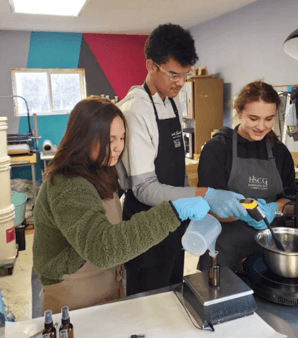 Another school year is coming to a close. As we archive old files and submit final grades, it’s time to start preparing for the fall semester. (Sorry, teachers, for completely skipping over the exhale that is 'summer'.) As educators, we are always on the lookout for new and exciting ways to engage students and enhance student agency in and outside of the classroom. For me, as Program Manager, that means immersing myself in iterations of our INCubatoredu and ACCELeratoredu curriculums.
Another school year is coming to a close. As we archive old files and submit final grades, it’s time to start preparing for the fall semester. (Sorry, teachers, for completely skipping over the exhale that is 'summer'.) As educators, we are always on the lookout for new and exciting ways to engage students and enhance student agency in and outside of the classroom. For me, as Program Manager, that means immersing myself in iterations of our INCubatoredu and ACCELeratoredu curriculums.
As I reflect on the year, dive into our curriculum, and set goals for next year, I take time to sit down with teachers, administrators, and community members who have a stake in student success. But my favorite conversations are the ones I have with students themselves.
When I speak with teen entrepreneurs, we don’t often talk about the nuts and bolts of a slide deck or assignment. We talk about what they learned throughout the school year, what was sticky enough to remember, what they picked up along the way, and what they’ll continue to use as they build up their businesses. These energizing conversations inspire me to translate student wisdom into curriculum iterations. But more often than not, I find that this extends well beyond the curriculum.
The wisdom I gain from teen entrepreneurs extends into my work, my life, and my conversations with other teachers. These students get it. They’re doing the real work. And I think we could all take a page from their book. So, without further ado, here’s a lesson from our high school pros.
First, Meet Commah - A Student-Founded Business
 Borne from a high school student entrepreneurship program, Commah is a brand of all-natural air fresheners created by seniors at Horace Mann High School in North Fond du Lac, Wisconsin.
Borne from a high school student entrepreneurship program, Commah is a brand of all-natural air fresheners created by seniors at Horace Mann High School in North Fond du Lac, Wisconsin.
The team won the Junior Achievement Northeast Region Young Entrepreneur Live Competition and made it to the semi-final round for Uncharted Learning’s 2021 National Competition. Lead by entrepreneurship educator extraordinaire, Kurt Wismer, students Lillian G., Samantha O., and Ayden F. are shining examples of success by demonstrating the skills of an entrepreneur and stepping outside their comfort zones.
So, what made this team so hard to beat? Let’s take a look at their recipe for success.
Pro Tips for Teen Entrepreneurs, by Teen Entrepreneurs
1. Fail fast and fail often
One of the tenets of INCubatoredu (and Uncharted Learning programs as a whole) is embracing failure as a learning opportunity. We’ve written blogs on this before…but when we talk about failure, we don’t mean failing in the traditional sense, like giving a student an “F” on a research paper. We’re talking about failing forward.
Allowing room for error and failure gives students the opportunity to learn what doesn’t work sooner, so they can innovate, collaborate, and problem-solve to find what does work, instead. For the Commah team, the road to success was paved with multiple product ideas—from heated windshield wipers to headlights that get brighter as needed, to scented fan blades and more—before they landed on the right product.
what doesn’t work sooner, so they can innovate, collaborate, and problem-solve to find what does work, instead. For the Commah team, the road to success was paved with multiple product ideas—from heated windshield wipers to headlights that get brighter as needed, to scented fan blades and more—before they landed on the right product.
Figuring out which type of product they wanted to sell and whether there was a market for it required Lillian, Samantha, and Ayden to do more than just collaborate with each other in the classroom. They also had to dig into research and trends, and get out into the community to learn more about consumer pain points and how their business could provide a solution.
2. Customers are crucial
We’ve all heard the saying, “the customer is always right,” and it’s as true today as it’s always been. Throughout their time in INCubatoredu, students learn the importance of understanding their customers. “We learned that your business is nothing without your customers,” said Ayden. “And, have a product. But if your customers don’t like your product, they’re not going to buy it.” Easier said than done, creating a product that customers like and want to buy requires empathy—and the Commah team learned about that in INCubatoredu, too.
What is empathy?
Empathy is the capacity to understand someone else’s emotions. Having empathy requires putting aside one’s own feelings and perspectives and feeling the emotions of someone else, instead. Students learn the importance of empathy in entrepreneurship early on, because without solving for real customer needs, a business can’t succeed.
Of course we’d all love to create businesses built solely around our own needs and wants, but empathy teaches students to consider a broader set of perspectives in the pursuit of entrepreneurial success. Moreover, research shows that empathy isn’t just a personality trait—it’s a skill that can be learned and strengthened just like any other.
3. Entrepreneurship is a mindset, not a timestamp
.png?width=280&name=2022.kurt.wismer.class%20(3).png) “You have to have the desire to succeed in this class,” says Samantha. “I don’t know if there is a way to timestamp it. You’re really living and breathing your business 24-7… but I think it’s more like 48-7.” As any entrepreneur will tell you, entrepreneurship is round-the-clock work.
“You have to have the desire to succeed in this class,” says Samantha. “I don’t know if there is a way to timestamp it. You’re really living and breathing your business 24-7… but I think it’s more like 48-7.” As any entrepreneur will tell you, entrepreneurship is round-the-clock work.
Entrepreneur or not, we all know that good ideas don’t only strike in the classroom or when we conveniently have a paper and pen at the ready. “I’m bouncing ideas off of the group a couple of times a day… or at midnight,” says Ayden. “We’re up all the time trying to think of new ideas for our customers.” This steadfast commitment to the team and ongoing iteration of their product is exactly what’s made Commah so successful so quickly… but it hasn’t always been so easy.
4. Teamwork is not always dream work
Developing empathy and an entrepreneurial mindset are two primary goals of any entrepreneurship program, but teaching students how to collaborate and work through issues in a constructive way is high on the list, too. “Working on a team can be difficult,” says Lillian. “We’re not always agreeing with each other. We can have some fights about the smallest thing, and we weren’t as close when we first began the program.”
Eventually, and with the help of their mentor, the student team learned to grow together as they grew their business. “We’ve probably had one or two big fights, but you learn from them,” Lillian says. “It’s critical not to take it to heart.” (Talk about having empathy!)
5. Trust is everything
Through early entrepreneurship education, teen entrepreneurs begin to learn just how much work is required to run a successful business or even simply advance an idea. And so much of that work is about relationship building. Though not always a cakewalk, being able to effectively communicate and work with a team is vital.
“You have to be trustworthy,” Ayden says. “You have to have patience—that’s definitely a big thing. And then you have to set boundaries.” He adds, “Don’t overstep what someone else may be doing. Let them figure it out for themselves and have them ask for help if they need it.”
By guiding their own learning, students have a daily opportunity to practice empathy and communication, make connections with their peers, and deepen relationships. Along the way, they’re inspired by purposeful learning, and discover that school can be fun.
6. School really can be cool
Students have a natural inclination toward curiosity and creativity. Whether they learn to effectively use those skills may depend on whether the skills are nurtured and encouraged in school. There’s another saying that promises, “If you love what you do, you’ll never have to work another day in your life.” Of course, we all have to work—and an important part of student success is ensuring they have the skills they’ll need to thrive in the workforce—but the sentiment stands. When we do something we love, we’re able to have fun with it. So it stands that if students can fall in love with their own learning, school will become a fun place to be.
“INCubatoredu is a really positive environment,” Ayden says. “Everyone’s always bouncing ideas off of each other.” And it’s not just students who get in on the action. Teachers, administrators, and even community members can’t help but be fueled by students thriving, problem solving, and growing a business from concept to creation. There’s something especially inspiring about watching teen entrepreneurs contribute to their community.
7. Age is just a number
 When most people hear “entrepreneurship,” they think of established business owners, Silicon Valley, or episodes of Shark Tank®️. But by now we all know that the skills of an entrepreneur benefit all.
When most people hear “entrepreneurship,” they think of established business owners, Silicon Valley, or episodes of Shark Tank®️. But by now we all know that the skills of an entrepreneur benefit all.
Entrepreneurship education teaches skills teens can take with them regardless of path. Students learn what’s happening in the real world from mentors, coaches, and business founders doing the same type of work that they are. Using the entrepreneurial tools and methodologies they learn, teen entrepreneurs gain the confidence to tackle big issues and accomplish big goals. “We’re taking on things most adults don’t know how to do,” Lillian says. “Don’t sell yourself short. Own your business and go out there and get it.”
8. (Social Media) content is king
Last but not least, we’d be remiss not to talk about social media and its impact on student startup success. “People want reviews,” says Samatha. “They want to know what’s new about the company.” Once again, we see the importance of connecting with and understanding the customer. And the students get it (largely because they’re big-time consumers of social media themselves, and they can see right through inauthentic brands).
“Whether it’s us hosting big events or popping up at a local craft fair, people want to know that information ahead of time,” Samatha says. “People want really authentic content—not only about our product, but also about our activities around the product. I really feel like it’s an extension of your whole brand.” (You can check out some of Commah’s social content here.)
Transform Learning with these Tips from Teen Entrepreneurs
The school year may be coming to an end, but these teen entrepreneurs are just getting started. Using what they’ve learned from high school entrepreneurship, Lillian, Samantha, Ayden, and their INCubatoredu peers around the country, are wrapping up the year with what I hope are the skills and mindset to help them handle whatever life throws them—and as an educator, that’s the best outcome I could hope for.